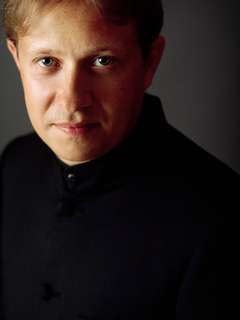|
Back
A Most Gentle Noise New York
Rose Theater, Lincoln Center
08/16/2010 -
Henry Purcell: Fantasia VII (Arranged by George Benjamin)
George Benjamin: Antara
Harrison Birtwistle: Two selections from Bach Measures – Slow Friezes
Johann Sebastian Bach: Contrapunctus VIX from The Art of the Fugue (Arranged by Luciano Berio)
Helmut Lachenmann: Mouvement (–vor der Erstarrung)
Claire Chase, Eric Lamb (Flutes), Jacob Greenberg, Cory Smythe (Pianos), Pierre-Laurent Aimard (Artist-in-Residence, Keyboard)
International Contemporary Ensemble (ICE). Ludovic Morlot (Conductor)

International Contemporary Ensemble (© Liz Linder)
”Even now with strange and several noises/Of roaring, shrieking, howling, jingling chains,/ And more diversity of sounds, all horrible,
“We were awaked.”
Thus the description The Tempest by Shakespeare’s Boatswain. Last night, we heard noises: roaring, and shrieking and certainly more diversity of sounds than the Bard could have imagined. But horrible? Never, never, never!
Pierre-Laurent Aimard was celebrating the valedictory concert of his quartet as Artist-in-Residence for part of the Mostly Mozart Festival, amongst whose composers Mozart was noticeably absent. But Mr. Aimard did explain that since Mozart is timeless, all music somehow fits into his compass. The explanation may be weak, but the music for the final concert was so strong that he is more than forgiven.
At first one had to wonder that any ensemble could exist to play this work. But after marveling at their quasar-sharp playing, the marathon sounds from percussionists Adam Sliwinski, Greg Boyer and Alex Lipowski, and the actual lack of cacophony, then one can listen to the International Contemporary Ensemble for pure pleasure.
Not the pleasure of loudness, for much of this was pointillistically soft, even tiny. But the joy of sound itself. It may lack any relation to human emotion, but within its musical prison, Mouvement (–vor der Erstarrung) (“Before the stillness” or “Before the paralysis”) has 23 minutes of pure passion.
Another large work, Harrison Birtwistle’s Slow Frieze (the pun was intended), was a self-conscious but still rewarding opposition of stasis and movement, the angular theme passed from one group to another.
The duration was 16 minutes, and I confess to not getting the hang of it for the first eight minutes. Then this convoluted theme got to me, and by then it was too late. Just as I could follow it, the music was drawing to a close.
And oh, I would like to hear it again, to continue on Mr. Birtwistle’s road trip, especially with Jacob Greenberg playing piano.
The third totally original work was George Benjamin’s Antar, an “Inca” (or correctly Quecha) word meaning “panpipes”.
(This happens to be my third Inca word, since on a visit to Peru, I learned the words for “beautiful dog”, so I could compliment villagers on their non-guinea pig pets. Should Mr. Benjamin wish to pen an opera on Inca dogs, the title would be “Munis Alco.”)
Mr. Aimard did the honors on a computer keyboard, two flautists provided other shrill panpipe sounds, but the entire ensemble led through a serious romp through the eerie sounds of Peruvian music writ not only large but grand.

L. Morlot (© Sussie Ahlburg)
The other works were 20th Century variations on the Baroque. Mr. Benjamin composed a dream-like homage to Purcell (thanks to a dreamy celesta). Two of Mr. Birtwistle’s Bach Measures were less imaginative, but showed the composer’s penchant for sonority.
Finally, Berio worked with Bach the way he worked with “his” Schubert symphony, keeping to an orchestrated fairly literal reproduction, intercepted by some intriguing dissonances.
Who was the star of this show? I didn’t envy conductor Ludovic Morlot. For much of these complex and stertorous pieces, it was his job to beat steadily, cue in (when possible), and keep the ICE together. With such great musicians, the last part was not an Augean task. On the whole, though, Mr. Morlot’s job–and successful it was too!–was to turn the Tempest physical noise into the Merchant of Venice’s inner musical “sweet wind…to gently kiss the trees.”
Harry Rolnick
|